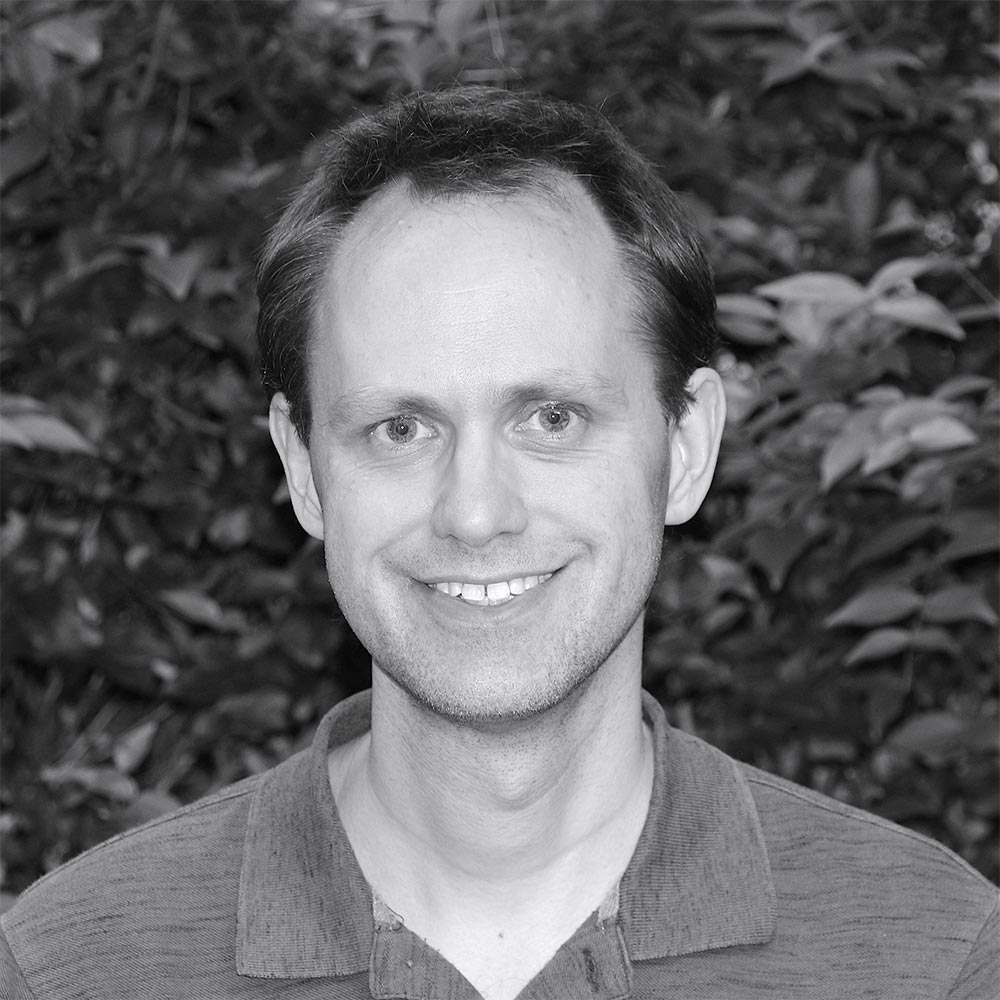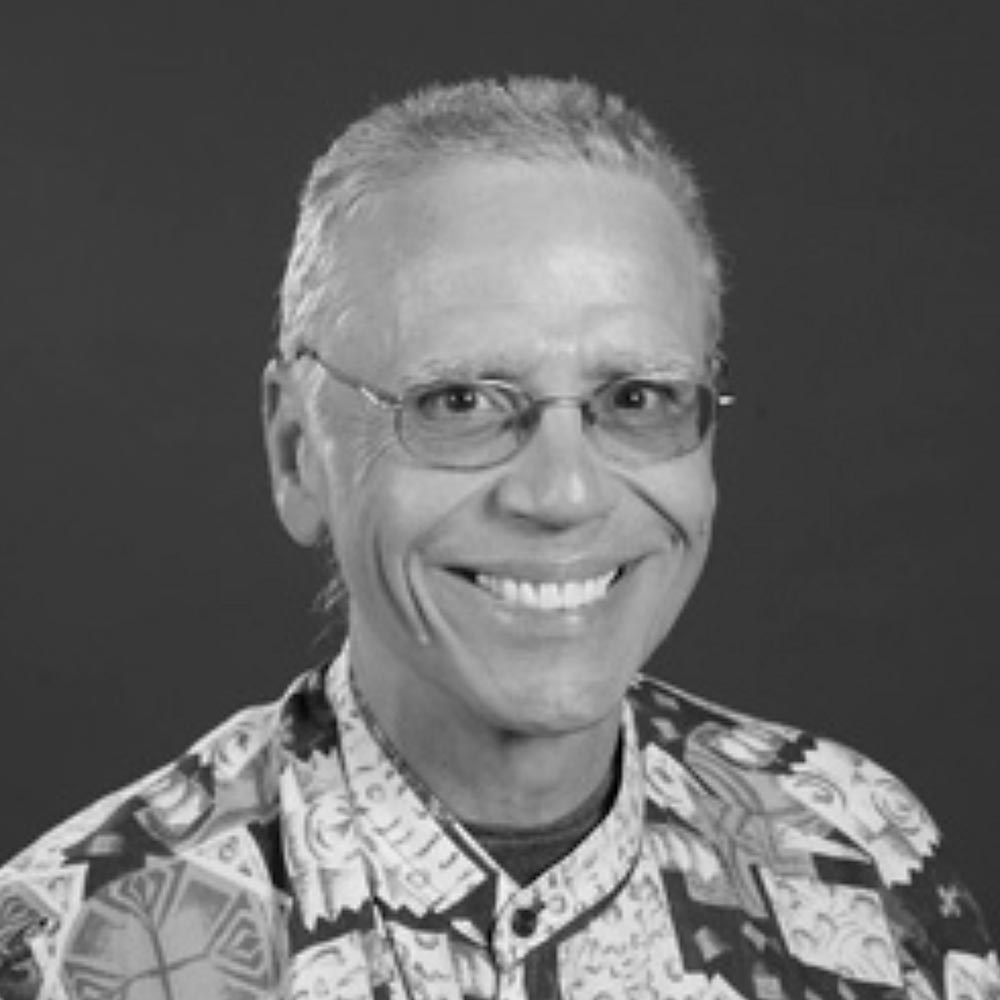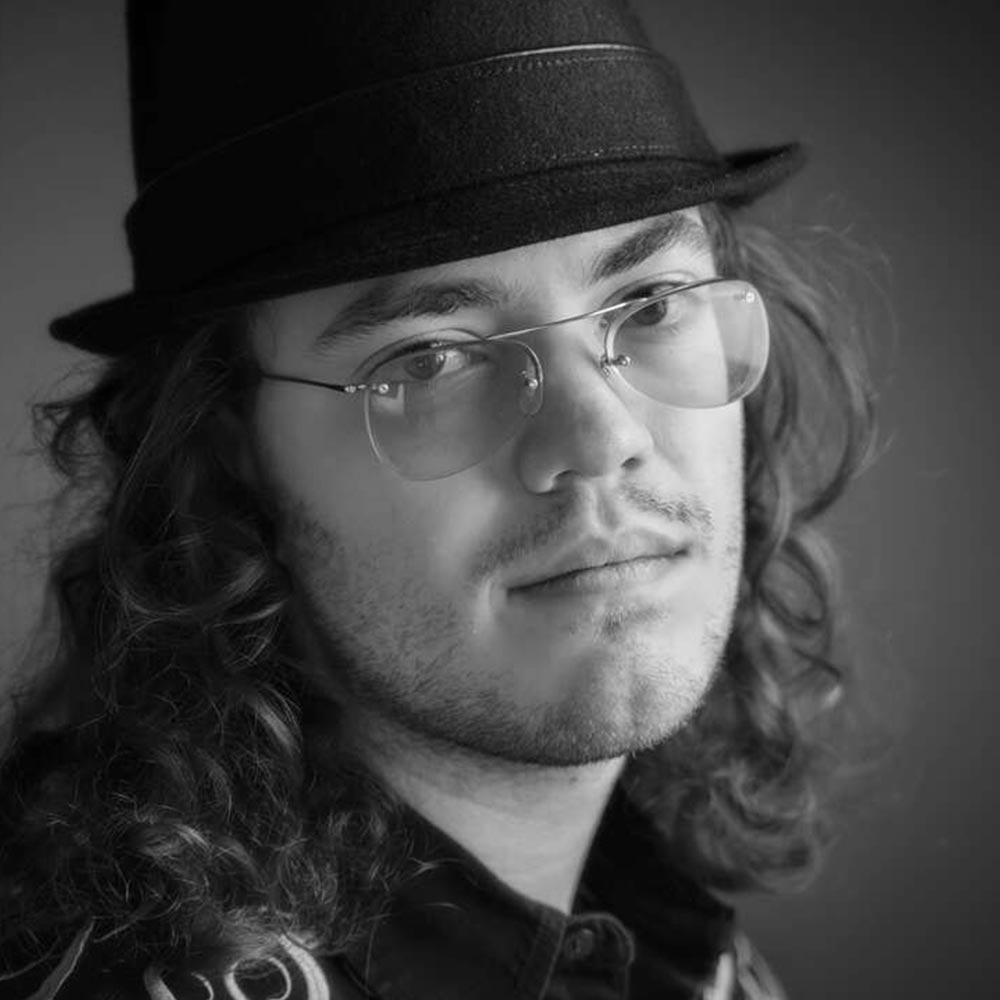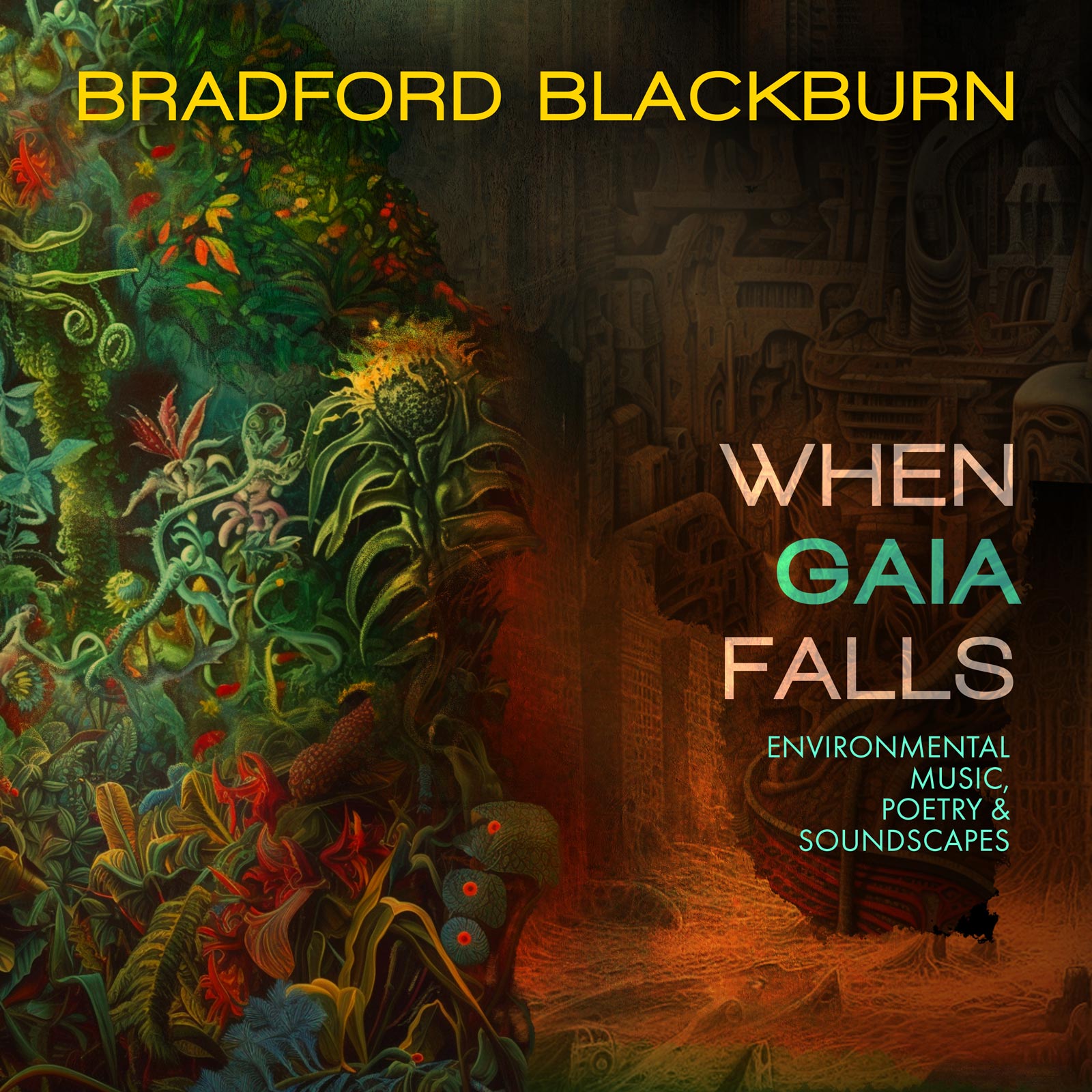When Gaia Falls
Bradford Blackburn composer
WHEN GAIA FALLS from composer Bradford Blackburn is an environmental call for action in the face of climate change manifested through musical, literary, and sonic eclecticism as a medium of universality. Its central message? There is no better time to save the future than the present.
From the body of electroacoustic, choral, and chamber works emerge a trio of narrative sub texts. The first, to simplify our needs and desires, the second, to make ecologically sustainable choices, and the third, to pursue positive change as a society. Bradford calls upon several artists to drive his message home in this release, spanning a variety of genres and moods that make a compelling case.
Listen
Stream/Buy
Choose your platform
Track Listing & Credits
| # | Title | Composer | Performer | |
|---|---|---|---|---|
| 01 | Act One: In Gaia’s Twilight | Bradford Blackburn | Ben Rosenblum Trio | Ben Rosenblum, piano; Marty Jaffe, double bass; Ben Zweig, drum set | 6:51 |
| 02 | Act One: The Last of the Survivors | Bradford Blackburn | Bob González, speaker | 3:13 |
| 03 | Act One: Lament for the Earth | Bradford Blackburn | Cody Austin, tenor solo; Ethan Lucas, tenor 1 and tenor 2; Matthew Jay, baritone and bass | 2:23 |
| 04 | Act One: The Woodlands Are Quieter | Bradford Blackburn | Bob González, speaker | 2:38 |
| 05 | Act One: Canticum Avium | Bradford Blackburn | 3:23 | |
| 06 | Act One: Hymn to the Earth | Bradford Blackburn | Amanda Cohen, soprano; Beck Barnes, alto; The University of Tampa MIX Lab Ensemble | Ethan Fair, Ben Tappouni, John Michael Kyker, Daniel Arteaga - electric guitar; Michayla Britton, keyboard; Sebastian Salvatore Italiano, electric bass; David Dickinson, percussion | 6:27 |
| 07 | Act One: Call and Response | Bradford Blackburn | 4:02 | |
| 08 | Act One: Outraged in Silence | Bradford Blackburn | Bob González, speaker; Bradford Blackburn, piano | 2:45 |
| 09 | Act Two: Broken Records | Bradford Blackburn | Ben Rosenblum Trio | Ben Rosenblum, piano; Marty Jaffe, double bass; Eric Kennedy, drum set | 4:46 |
| 10 | Act Two: No Bugs | Bradford Blackburn | Bob González, speaker | 1:54 |
| 11 | Act Two: Vox Insecta | Bradford Blackburn | 5:56 | |
| 12 | Act Two: Eleventh Hour | Bradford Blackburn | Ethan Fair, electric guitar (with distortion); Ben Tappouni, electric guitar (clean; distorted lead solo); Sebastian Salvatore Italiano, electric bass; David Dickinson, drum set | 6:25 |
| 13 | Act Two: Before the Fall | Bradford Blackburn | Bob González, speaker | 3:10 |
| 14 | Act Two: Trance-Figuration | Bradford Blackburn | Bradford Blackburn, electroacoustic bassoon | 8:06 |
| 15 | Act Two: Message from the Future | Bradford Blackburn | Cody Austin, tenor solo; Amanda Cohen, soprano; Beck Barnes, alto; Ethan Lucas, tenor; Matthew Jay, bass; Ethan Fair, electric guitar; Bradford Blackburn, electric bass; David Dickinson, drum set | 6:13 |
Track 1-4, 6, 8-10, 12-13, 15
Instrumental and vocal parts recorded January 2022-March 2023 at The University of Tampa, Ferman Center for the Arts, Recording Studio in Tampa FL
Track 2
Electroacoustic music produced in Spring 1995 at the State University of New York at Fredonia, Electronic Music Studio in Fredonia NY
Tracks 4, 7, 10, 13
Field recordings made August 2023 at Myakka River State Park in Sarasota FL
Track 5
Field recording made June 2021 Riverside Heights in Tampa FL
Computer music produced April-May 2022 at The University of Tampa in Tampa FL
Track 11
Field recording made September 2003 at Meadowbrook Park in Urbana, IL
Electroacoustic music produced February 2004 at the University of Illinois Urbana-Champaign, Experimental Music Studios in Urbana IL
Track 14
Electroacoustic music produced in 2005 at the University of Illinois Urbana-Champaign, Experimental Music Studios in Urbana IL
Recording Engineer & Producer Bradford Blackburn
Mastering Engineer Melanie Montgomery
Executive Producer Bob Lord
A&R Director Brandon MacNeil
A&R Jeff Leroy
VP of Production Jan Košulič
Audio Director Lucas Paquette
VP, Design & Marketing Brett Picknell
Art Director Ryan Harrison
Design Edward A. Fleming, Morgan Hauber
Publicity Aidan Curran
Artist Information

Bradford Blackburn
Bradford Blackburn (b. 1974) is a composer, music technologist, and music theorist whose work explores electroacoustic and interactive music, new musical interfaces, extended just intonation, immersive audio, environmental sound, live video processing, sonification of movement and gesture, contemporary music performance, improvisation, and the construction of experimental musical instruments.

Bob González
Bob González’s research includes spoken word performance, devised/collaborative theater, and creativity theories and practices. His dissertation, The Drama of Collaborative Creativity: A Rhetorical Analysis of Hollywood Film Making-of Documentaries, studies the communication processes involved in collaborative creativity.

Ben Rosenblum
Award-winning New York City jazz pianist and accordionist Ben Rosenblum has been described as “mature beyond his years,” (Sea of Tranquility), an “impressive talent” (All About Jazz), who “caresses [the music] with the reverence it merits” (Downbeat Magazine). Since the release of his debut trio album, Instead (4 stars, Downbeat), Rosenblum has toured extensively with his trio and sextet throughout the United States, including multiple trips to the Northeast, Midwest, South and West Coast, as well as internationally in Canada, Europe, and Japan. He was a featured soloist at Carnegie Hall’s Stern-Perelman Auditorium — with Reona Ito’s New York Harmonic Band — and has appeared at prestigious venues throughout the world, including at the Appel Room at Lincoln Center, Kuumbwa Jazz Center, Ravinia, Himawari-No-Sato Concert Hall in Yokohama, Bird’s Eye in Basel, and the Library of Congress. Rosenblum’s second trio album in 2018, River City, was called “richly romantic” and “well-realized” by JAZZIZ Magazine, which featured the title track as part of their Best of Fall 2018 CD. Most recently, Rosenblum released his third album, Kites and Strings, which is the first to feature him on both piano and accordion alongside his new sextet, the Nebula Project. In 2020, the Nebula Project was voted runner-up for Best New Artist in JazzTimes‘ Readers’ Poll. Rosenblum has been privileged to share the stage with many highly acclaimed jazz musicians, including extensive work with Curtis Lundy, Winard Harper, Deborah Davis and Chris Washburne, as well as appearances with Bobby Watson, Sean Jones, TS Monk, Warren Wolf, Eliot Zigmund, and many others. Rosenblum’s musical interests also extend beyond jazz to include work in numerous world music scenes, including musical styles from Brazil, Peru, Croatia, Bulgaria, India, Ireland, Jewish traditions and more.
Notes
Here in the 21st Century, well into the Anthropocene, there is probably no greater existential crisis than the rapid degradation of the Earth’s ecosystems and biodiversity due to human causes. For millennia, living as small bands of hunter gatherers, our hominid species had a relatively minor impact across the Earth. Our ancestors lived precariously, but in an ecological balance with the natural world. We learned to thrive through agriculture, industry, and technology, but the consequences of our dominion over nature grew devastating. The ecosystems on which complex lifeforms on Earth depend, including us, are on the verge of collapse. Gaia, the Earth’s web of life, is rapidly unraveling.
Despite this stark context that is the reality of our time, the musical, poetic, and sonic journeys of When Gaia Falls are not intended to invoke despair, but to instead provide a hopeful exhortation for positive social change. There is no better time to save the future than the present…this is the central message of the work. It is a call for action manifested through musical, literary, and sonic eclecticism, as a medium of universality.
Within this cycle of music, poetry, and sound, there is a trio of narrative subtexts that emerge. Firstly, by simplifying our needs and desires, we may return to a time when we lived in harmony with Gaia. Secondly, when we persist with life choices that are not ecologically sustainable, we are accomplices in Gaia’s undoing. Thirdly, without making changes to become ecologically sustainable, organic life and diverse ecosystems on Earth will decline and perish. The first two subtexts are articulated by the speaker (performed here by Bob González, Associate Professor Emeritus of Theatre at The University of Tampa), who conveys our human experience with nature. The sung vocal parts in the work portray the third subtext about an apocalyptic future. They are composed and performed from the perspective of future A.I. protagonists existing in a post-apocalyptic world, who figuratively reach back across time to implore human beings in the Anthropocene to save the natural world while they still can. The operatic tenor soloist — performed here by guest artist Cody Austin — represents a noble version of humanity, who at first laments the destruction of Gaia, but then heroically rises to save it through conservation.
Most of the field recordings in the work were recorded at Myakka River State Park in Sarasota FL in August 2022. The park, with its lake, marshes, meadows, and woodlands, stands out as a jewel for wildlife soundscapes on Florida’s Gulf Coast. A particular highlight of these sessions is featured in the track Call and Response, where a poetic interspecies dialogue between a raven and an army of frogs took place. The recordings were made with an Ambisonic microphone and mixed down to a binaural stereo format to preserve a sense of immersion in a wild landscape for the listener, when listening on headphones. Similarly, the music on the album was mixed in binaural stereo to simulate the experience of being within a musical landscape, when listening on headphones, or a greater sense of clarity when listening on speakers.
A recurring musical structure throughout the cycle of pieces is a prolonged build-up of volume and dissonance, followed by a precipitous drop, and or a period of entropic decay. This structure is meant to be symbolic of humanity’s growing environmental impact, and the dramatic collapse and or decline of ecosystems that will result if humanity is unable to choose a sustainable path.
In Gaia’s Twilight and Broken Records were both written for the Ben Rosenblum Trio and were recorded during their Southeast United States tours in 2022, while they were visiting The University of Tampa. In Gaia’s Twilight is a contemplative nocturne for an analog jazz trio, while Broken Records is an up-tempo metaphor for the normalization of apathy in response to ever more shocking statistics about environmental degradation in the news, in an ever more digital world.
Spread throughout the album is a cycle of ecopoems by Bradford Blackburn. The Last of the Survivors is a meditation on the plight of whales, and by extension, the aquatic life on Earth that humanity does not yet fully understand or appreciate. The Woodlands Are Quieter reflects how our developing world sacrifices wildlife habitat for ceaseless growth and convenience. Outraged in Silence is a piece, expressed through angst, that questions complacency and hesitation, presenting them as obstacles that must be overcome for positive change to occur. No Bugs is an ironic litany, portraying the paradox of ridding the world of insects for being a nuisance, while considering their necessity and value. Before the Fall is ambiguously narrated from the perspective of either a human at the end of civilization, or a future A.I. recalling an organic world it never knew, except through the data of its memory.
Several electroacoustic pieces appear on the album as abstractions of the narrative ideas presented in the ecopoetry. Canticum Avium (Song of the Wilderness) features a field recording of a mockingbird, coupled with an 8-channel additive synthesis piece created with Max, that responds to it antiphonally. Vox Insecta begins with a field recording of cicadas, and then morphs into an electroacoustic, densely microtonal composition reflecting the polyphony of insect swarms. Trance-Figuration is an electroacoustic work performed on bassoon and processed through a vocoder. The piece includes march-like sections reflecting the hypnotic momentum of development that is propelling us toward environmental catastrophe and chaos, leaving behind a transfigured world. Additionally, the progressive rock piece Eleventh Hour is a musical metaphor for the urgency of acting now, made palpable through its tolling conclusion.
The choral pieces on the album all utilize the same exhortative texts, but with very different musical settings. The texts are sung in Latin as a metaphor for the universality of the messages they convey. Lament for the Earth is a funeral dirge, written for male vocal quartet and tenor soloist, accompanied by a drone-like electronic accompaniment symbolizing entropy. Hymn to the Earth is a gamelan inspired composition for a contemporary music, improvisation ensemble with soprano and alto voice soloists. Message from the Future is the dramatic conclusion of the cycle and portrays a call from a future A.I. to present day humanity, to remind us of the future we are heading toward, before we create it.
Funding for this album was provided by a Research Innovation and Scholarly Excellence Award from The University of Tampa.
— Bradford Blackburn

